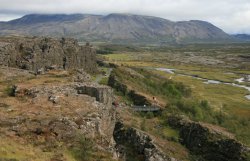2 012, AUGUST 30: ICELAND, GOLDEN CIRCLE (GEYSIR, GULLFOSS & PINGVELLIR)
In the morning, I woke up with light-headedness, most
probably on account of dehydration. To rehydrate myself, I consumed
considerable amount of water, while going through the morning routines Then I rested
for a while, before going down to the hotel restaurant for breakfast. Back in
our room, I rested some more and consumed more water.
By the time of noon pick up by the Excursion Bus, I felt
a little better. But in the bus, my stomach started acting up, probably in
reaction to the milk I had with uncooked rolled oats cereal.
In spite of the physical discomfort most of the day,
Kundan and I enjoyed our six-hour excursion to Geysir, Gullfoss, and
Pingvellir.
On the way, we went through the village of Hveragerdi. It
is known as the flower town. In its large number of greenhouses the villagers
grow all kinds of flowers, vegetables, and fruit. In fact, because of their
work, Iceland is known for the largest production of bananas in the North
Atlantic.
 |
| Greenhouses, Hveragerdi, Iceland |
Geysir is the
original spouting hot spring; all the others around the world are named after
it. At one time, it spouted a jet of water up to 80m (262ft) into the air. But
it is rather inactive currently,
However, nearby is Strokkur (the Churn), the world's most consistent geyser. It shoots out a stream of water and steam up to 35m (115ft) and erupts every six minutes or so, and sometimes twice in quick succession.
Also there are some mud pools and steam vents in the area.
Mud Pools & Steam Vents, Strokkur, Iceland
However, nearby is Strokkur (the Churn), the world's most consistent geyser. It shoots out a stream of water and steam up to 35m (115ft) and erupts every six minutes or so, and sometimes twice in quick succession.
Strokkur, Iceland
Also there are some mud pools and steam vents in the area.
Mud Pools & Steam Vents, Strokkur, Iceland
Path to Strokkur Field, Iceland
Our next stop was the Iceland’s most famous waterfall,
the majestic and beautiful, Gullfoss,
with double cascade.
Gullfoss Falls, Iceland
Thanks to the daring efforts, led by Sigridur i Bratholti, it escaped destruction in the 1920’s, when a team of foreign investors tried to dam the river by building a hydroelectric project. Now, a pillar nearby memorializes Sigridur for her courageous work, to save the waterfall.
Gullfoss Falls, Iceland
Gullfoss Falls, Iceland
Thanks to the daring efforts, led by Sigridur i Bratholti, it escaped destruction in the 1920’s, when a team of foreign investors tried to dam the river by building a hydroelectric project. Now, a pillar nearby memorializes Sigridur for her courageous work, to save the waterfall.

Sigridur i Bratholti
From the Visitor Center, a long boardwalk leads to a
gravel path above and to a wood staircase down to view the falls from different
perspectives.
From near the Visitor Center, it is possible to view the
distant, but large ice-field which sustains the river and the water fall.
Ice-field
The fissure between them, at this place, is as wide as seven kilometers. The rift valley thus created supports pools of water teeming with fish and are good for snorkeling.

Thingvellir National Park, Iceland
Nearby is Althingi, the oldest parliamentary organization, which was established in the present day Thingvellir National Park, in AD 930.
Althingi & Thingvellir National Park Visitor Center

19th-century rendering of the Law Rock, in Thingvellir,
where Althingi was established in 930 A.D. (Wikipedia)
where Althingi was established in 930 A.D. (Wikipedia)
In 2004 Thingvellir was added to UNESCO's World Heritage List.
Around 6:30 we returned to our hotel.











0 Comments:
Post a Comment
<< Home